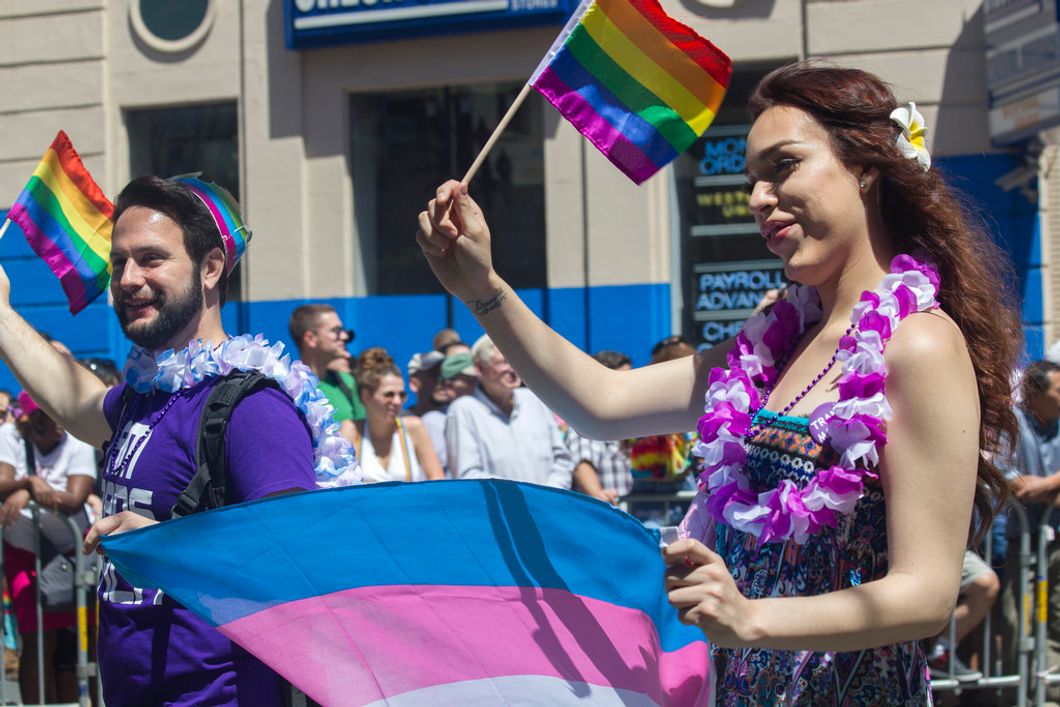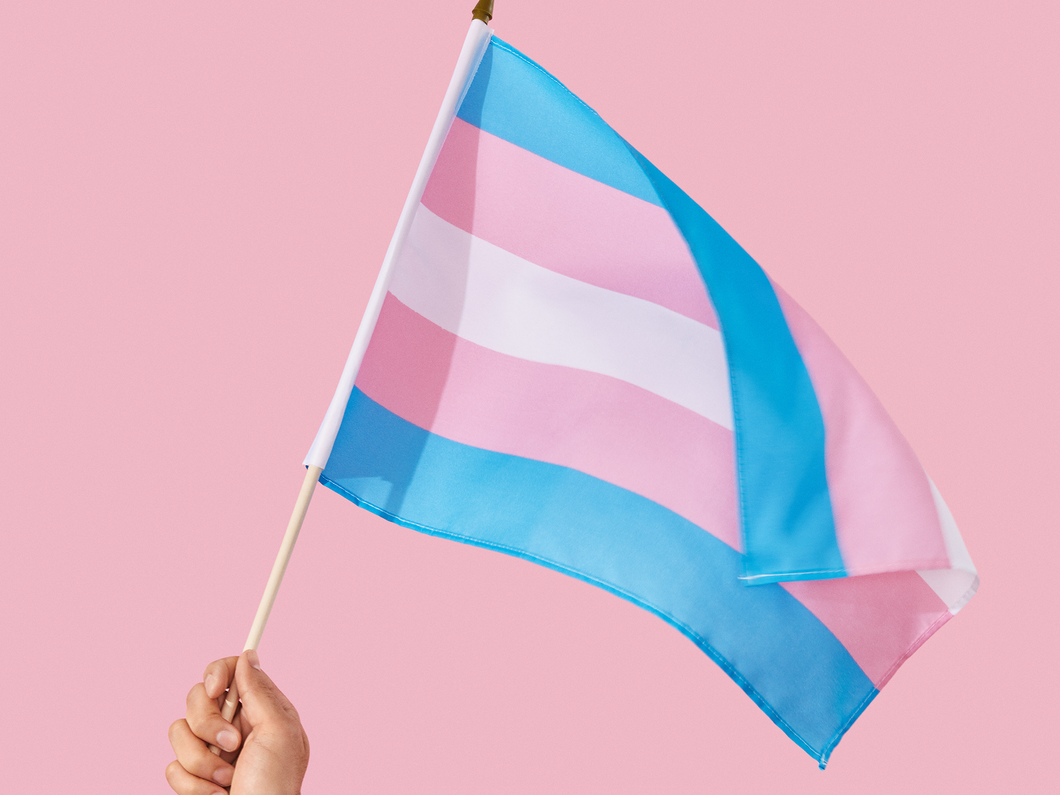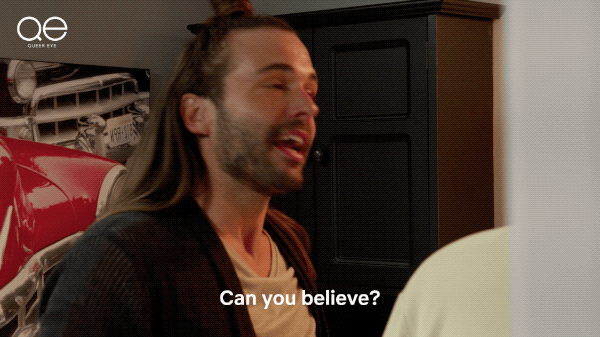What Preferred Pronouns Mean To Me, And It Actually Doesn't Have Anything To Do With Someone 'Assuming My Gender'
It's time for that joke to be put to bed.
Ever since coming out as gender-fluid, it's been a chore to figure out what pronouns I like, when I want them used and who to confide them in.
I say that because, clearly, it's not safe to tell some people—maybe even most people—that I'm trans, even if it's only part-time.
It's hard enough for binary-trans people, who have one unshifting identity, to have their preferred pronouns respected. Then, even if their pronouns aren't laid out on the table, trans and general queer people live in constant fear for their physical and emotional safety merely because of their appearance.
While this should be common knowledge, many people still insist on the jokes "Did you just assume my gender" or "Are you misgendering me?" (said mainly by cisgendered people, mind you) as if transgender people have the luxury of challenging people who do misgender them.
To someone who's never had to question a fundamental quality in themselves, or experienced the harassment that comes along with expressing it, I'm sure these jokes feel like they're not a big deal. What it really does is turns trans identity into a joke, and acts as a mental block against learning about trans lives to understand what a person's gender might mean to them.
All of this leads to a lot of uncomfortable people, cis and trans alike. Trans people are stuck between a rock and a hard place, unhappy with staying closeted but aware that coming out means losing respect; cisgender people get stuck inside ignorance—as they don't advertise themselves as safe spaces willing to learn, so people don't bother—and preferred pronouns become the trait of freaks and outsiders.
When I first started experimenting with he/him pronouns, I certainly got that vibe from my peers.
Testing the waters with my friends was embarrassing and awkward to ask, not to any fault of their own, but because I knew what that request would mean.
In a way, it felt like I was asking them to rethink who I was entirely. At the very least, although it went unspoken, we knew that I was hoping the way they interacted with me, described me to others and, obviously, addressed me would change. Though the fact is I was the same person I always had been, I was asking them to acknowledge a whole new side of me that was previously unbeknownst to us all.
Because I have one of the best support systems in the world, this went over relatively easy.
Some trans folks don't even make it past this step without losing friends, losing family, losing respect or just losing the confidence to self identify.
With my friend's support, every time I was referred to as a boy my heart would sing; the joy caused a physical reaction and it was so strong. It fulfilled a void I only barely recognized before and never dreamed to explore.
The trial-run with my friends went so well that I moved on to the workplace. I worked for the Office of Equity and Inclusion and the Academic Success Center at Sam Houston State where I felt relatively safe, but this step was still scary because I was revealing myself to adults—and some traditional ones at that—for the first time. I was only disappointed by one, who tried halfheartedly for a few weeks to not use my dead name and he/him to address me before it fizzled and died.
This is another major fear of trans people. Not only were the courage, nerves, and stress it takes to come out completely wasted, but now they know you're different.
Like I said before, those departments were pretty low risk of incurring discrimination, but most trans people aren't nearly in the same situations. Since most states don't have legal protections in place for transgender people, this misfire could result in a person's whole life being changed. Fear of harassment and assault is only one side of the coin.
I got exceptionally lucky since one of my departments responded with flying colors (pun absolutely intended.) Granted, a lot of the people there are queer themselves, but their acceptance meant more to me than I could ever express.
To this day, my cis, white, male boss uses they/them pronouns to address me if he doesn't know where I'm leaning that day. My coworkers go out of the way to ask "How are you feelin' today?" at the beginning of the shift to confirm which to use. I bound my chest for the first time there, they put my preferred name on my name-tag and I've received nothing but support for my new dress and style despite their seeing me one way for almost four years.
If I hadn't gotten that reaction from even one person outside of my support group, I probably would've given up trying altogether. Having people accept you—not because they have to, but because they want to—is all we're hoping to gain by coming out to someone.
Now my pronouns are a luxury that the majority of trans people cannot afford, especially because they change pretty regularly. But I also had to accept that even this atypical acceptance comes with a grain of salt.
For one, my goal is to leave the door open if someone should have questions about my identity. Therefore, my preferred pronouns are just that—preferred—because I don't want to make anyone uncomfortable by forcing people to use them, which could then make me unapproachable if someone wanted to talk.
That doesn't mean she/her pronouns are still preferable.
For myself and many other trans people, pronouns are all about validation.
Mistakes happen. Since society conditions us to look at a physically female person and think "her" literally since our birth, it's understandable that people should get preferred pronouns wrong from time-to-time.
All we want is to feel like you're trying.
Transgenderism is characterized by gender and/or sex dysphoria, which is the dissatisfaction with the gender and sex assigned at birth. Quite literally, you cannot be trans without some degree of pain and unhappiness. So, the whole point of pronouns is to reduce that feeling—which is largely ever-present—as much as possible to attain the type of joy or euphoria, that he/him pronouns bring me.
Considering the pain being trans in public brings, how extensive the process of self-identifying is and the possible repercussions of coming out, no trans person's first reaction to being misgendered is anger. Granted it is extremely irritating if you've told the person several times what you prefer to be called since it's such blatant disrespect. But most of the time, at least in my experience, being misgendered just brings sadness.
Every time I'm called "ma'am" in public my heart aches a little bit. Every time a service person goes to she/her pronouns automatically, it's a stark reminder that I'll never look the way my brain tells me I should. Every time I'm referred to as a lady I lose hope that I'll ever casually pass for a man. Every time I walk into the women's restroom I know I'll never have the right parts to use the bathroom I feel like I should be in.
So, when someone purposefully calls you something they know will make you uncomfortable, you're reminded that most of the world really doesn't give a damn about what your brain knows to be true or feels the need to expend any amount of effort to make you feel OK around them.
Transgender people are a minority group, so refusing to use someone's preferred pronouns or learn about why they're used sends the message that you don't care for them enough to transcend that.
Thankfully, though, being forced to take the short end of the stick tends to breed some tough ass underdogs. And, regardless of how much people wish we'd disappear, we're still here and still queer.



























I'm Standing With My Trans Sisters And Boycotting Victoria's Secret
Victoria's secret has been revealed, and it's just as discriminatory as we all suspected.
In a recent interview with Vogue, Victoria Secret's CMO Ed Razek was asked about why the company's infamous fashion show does not include plus-size and transgender models. To this, he replied that the show was meant to be a fantasy, and that they include models that appeal to the markets they sell to, not the whole world.
Reading between the lines with barely a smidgen of effort, Razek meant that their goal is appealing to their cis-female, 14- to 18-year-old demographic so that those customers can better appeal to the white, cis men—the show targets, which explains all the meatless, opinion-less models.
Who cares if they promote unrealistic standards for girls with real-life bodies who aren't #TrainedLikeAnAngel?
In an effort to create that fantasy, they certainly can't be bothered to worry about the fatsos and trannies, too.
Anyone could've told Razek that secret should've stayed in the closet, but it is not altogether surprising coming from a company who only reluctantly started celebrating their top models' racial diversity and national backgrounds.
Unbeknownst to Victoria, representation for the trans community has exploded in recent years with the fashion industry leading the way. Under the influence of supermodels and activists like Arisce Wanzer, Carmen Carrera, Isis King and MiMi Tao, these women and their equals have gone from being token "trans models" to simply owning the supermodel title they so rightly deserve.
Even despite the Trump administration's most recent attack on trans rights, campaigns like Laverne Cox's #TransIsBeautiful have emboldened more trans and gender nonconforming people than ever before to be themselves in everyday society.
Victoria's Secret apparently didn't get that memo.
From a marketing standpoint, the company's stubborn refusal to change with the times is absolutely moronic. Every day, commercial brands like Arie, Gap, and H&M come out with new lines and campaigns that cater to a variety of people of all colors, creeds, shapes and sizes.
Yet, Victoria's Secret Pink line still doesn't even provide sizes past XL.
It's this obvious exclusion that has made the popularity of their fashion show decline in recent years, for young girls and femmes can no longer relate to the content.
While the size discrimination may be attributed to the availability of the cheap, uncomfortable materials the company refuses to branch out from, Razek's comments brought their discriminatory practices into stark relief.
The CMO's opinions set off a firestorm for the company, taking heat from plus-sized and trans models alike, but many of the outraged voices from trans activists were of a similar tune.
Trans women live their dream fantasy every day by simply being themselves, whether or not that fits Victoria's Secret's cookie-cutter vision for what that should be.
By refusing to include the queer community in their beauty standards, they are ignoring what the company symbolizes to many trans women who are brave enough to be themselves.
As Victoria's Secret is one of the most accessible lingerie brands on the market, I can only imagine how young trans ladies must feel when they purchase their very first piece of lady's underwear from the retailer. For a company that represents the pinnacle of womanhood and sexuality to so many developing girls, this could be a pivotal moment in many trans women's lives.
Razek's comments confirmed that the company couldn't give less of a damn about this portion of their clientele or what their brand might have represented.
With that in mind, it's no wonder this statement is quickly becoming the tipping point in the company's relationship with young people who are only going to keep getting more progressive.
Indeed, I and many other young millennials have already started to grow tired of the brand's repetitive patterns, unrealistic fit and vanilla beauty standards for some time now. It's foreseen that the company will lose more than just their queer customer base after this blunder.
It's a shame this company is so resolutely stuck in their outdated ways, refusing to embrace the inspiration that people like Christian Siriano and Ashley Grahm inspire, when they started off as a trailblazer in celebrating women's sexuality. But it's sheer, delicious luck that this happened the same year Rihanna graced us with her presence in the commercial fashion industry.
So, in the words of the infamous Trace Lysette, I'm marching over to Savage Fenty with my dollars.